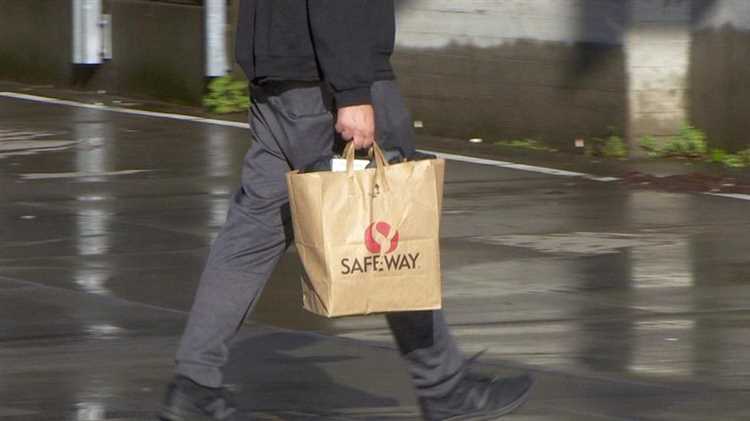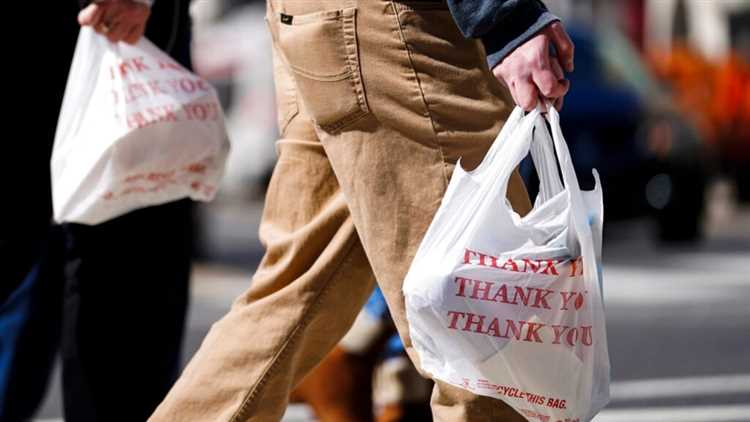Bag tax has become a hot topic in recent years, and Oregon is one of the states that has implemented this policy. As of January 1st, 2020, Oregonians are required to pay a small fee for each disposable bag they use when shopping. This measure aims to reduce plastic waste and encourage consumers to bring their own reusable bags.
But how much does the bag tax in Oregon actually cost? The answer depends on the type of bag you use. For plastic bags with a thickness less than 4 mil, the tax is 5 cents per bag. This fee is not limited to grocery stores; it applies to all retail establishments that provide disposable bags, including convenience stores, restaurants, and even farmers’ markets!
While 5 cents may not seem like a significant amount, the costs can quickly add up, especially for frequent shoppers. For instance, if you buy groceries every week and use just 4 disposable plastic bags, you would be paying an additional 20 cents per month, which amounts to $2.40 per year. Multiply that by the number of households in Oregon, and you’ll see that the bag tax has the potential to generate a substantial amount of revenue.
- Overview of Bag Tax in Oregon
- Impact on Consumers
- Environmental Benefits
- What is the Bag Tax?
- How does the Bag Tax work?
- Benefits of the Bag Tax
- Bag Tax Implementation in Oregon
- Benefits of the Bag Tax
- 1. Environmental Conservation
- 2. Reduction in Litter
- 3. Economic Benefits
- Question-answer:
- How much is the bag tax in Oregon?
- What type of bags are subject to the bag tax in Oregon?
- Why was the bag tax implemented in Oregon?
- Are there any exemptions to the bag tax in Oregon?
Overview of Bag Tax in Oregon

Oregon is one of the states in the United States that has implemented a bag tax policy. The bag tax was introduced as a way to reduce plastic waste and encourage people to use reusable bags when shopping. The policy requires retailers to charge a fee for each single-use carryout bag that a customer uses. This fee typically ranges from 5 to 15 cents per bag, depending on the retailer.
The bag tax in Oregon applies to all types of single-use carryout bags, including both plastic bags and paper bags. The tax is intended to deter people from using these disposable bags and instead opt for more sustainable alternatives. The revenue generated from the bag tax is typically earmarked for environmental initiatives or programs that promote recycling and waste reduction.
Impact on Consumers
The bag tax has a direct impact on consumers in Oregon. When shopping, consumers are now required to either bring their own reusable bags or pay the fee for each single-use bag they use. This encourages consumers to be more mindful of their bag usage and consider the environmental impact of their shopping habits.
While the bag tax may be seen as an additional expense for consumers, it also presents an opportunity for people to make more sustainable choices. By investing in reusable bags, consumers can save money in the long run by avoiding the bag tax and reducing their reliance on disposable bags.
Environmental Benefits
The implementation of the bag tax in Oregon has resulted in several environmental benefits. One of the main goals of the policy is to reduce plastic waste, as single-use plastic bags are a significant contributor to pollution and litter. By incentivizing consumers to use reusable bags, the bag tax helps decrease the demand for disposable bags and encourages the adoption of more environmentally friendly alternatives.
Additionally, the revenue generated from the bag tax can be used to fund recycling and waste reduction programs, further promoting sustainability in the state. By supporting these initiatives, the bag tax contributes to a cleaner and healthier environment for all Oregon residents.
What is the Bag Tax?

The Bag Tax is a policy implemented in the state of Oregon that aims to reduce the use of single-use plastic bags and encourage the use of reusable bags. This tax is a fee imposed on retailers for each single-use plastic bag provided to customers at the point of sale.
The Bag Tax was introduced as a measure to address the environmental impact of plastic bags on the state’s natural resources, wildlife, and waste management systems. Plastic bags are notorious for their negative impact on the environment, as they are not biodegradable and can persist in the environment for hundreds of years.
By imposing a tax on single-use plastic bags, Oregon hopes to discourage their use and incentivize shoppers to bring their own reusable bags. The revenue generated from the Bag Tax is used to fund various environmental programs, such as recycling initiatives and pollution reduction efforts.
How does the Bag Tax work?
The Bag Tax is levied on retailers for every single-use plastic bag provided to customers. The amount of the tax varies depending on the location, but it is typically a few cents per bag. Most retailers pass this cost onto the customers, either by adding it to the total purchase price or itemizing it as a separate fee.
However, there are exemptions to the Bag Tax for certain categories of bags, such as bags used for bulk items, frozen foods, or prescription medications. Additionally, low-income individuals who rely on public assistance programs are often exempt from paying the Bag Tax.
The aim of the Bag Tax is not to generate revenue, but rather to discourage the use of single-use plastic bags and promote sustainable alternatives. By making single-use plastic bags more expensive, it encourages individuals to bring their own reusable bags or opt for alternative packaging options.
Benefits of the Bag Tax
The Bag Tax has several benefits for both the environment and society. By reducing the use of single-use plastic bags, it helps to minimize plastic waste and the associated environmental pollution. This, in turn, helps to protect wildlife, ecosystems, and waterways from the harmful effects of plastic pollution.
The Bag Tax also encourages the use of reusable bags, which are a more sustainable alternative to single-use plastic bags. Reusable bags are typically made from more durable materials and can be used multiple times, reducing the demand for plastic bags and the resources required to produce them.
Furthermore, the revenue generated from the Bag Tax can be used to fund environmental programs and initiatives, such as recycling infrastructure, education campaigns, and research on plastic pollution. This helps to support the development of a more sustainable and environmentally conscious society in Oregon.
| Benefits of the Bag Tax | How does it work? |
|---|---|
| Reduces plastic waste and pollution | Levied on retailers for each single-use plastic bag provided to customers |
| Promotes the use of reusable bags | Varies depending on location, typically a few cents per bag |
| Supports environmental programs | Exemptions for certain categories of bags and low-income individuals |
Bag Tax Implementation in Oregon
In order to reduce plastic waste and encourage the use of reusable bags, the state of Oregon has implemented a bag tax. The tax is designed to incentivize consumers to bring their own bags to grocery stores and other retailers.
Under the bag tax law, customers are charged a fee for each single-use plastic or paper bag provided by the retailer. The fee is typically around five cents per bag, but it may vary depending on the store and location. Retailers are required to clearly indicate the cost of each bag on the customer’s receipt.
The implementation of the bag tax in Oregon has had a positive impact on reducing plastic bag consumption. It has encouraged shoppers to bring their own reusable bags, leading to a decrease in the demand for single-use bags. As a result, less plastic waste ends up in landfills and the environment.
The bag tax implementation has also generated revenue for the state of Oregon. The fees collected from the bag tax are used to fund environmental initiatives, such as recycling programs and clean-up efforts. This ensures that the funds collected through the bag tax are put towards environmental sustainability.
Overall, the bag tax implementation in Oregon serves as a successful model for reducing plastic waste and promoting reusable bag usage. It has effectively changed consumer behavior and provided financial support for environmental initiatives. Other states and regions can look to Oregon as an example for implementing their own bag taxes to address the issue of plastic pollution.
Benefits of the Bag Tax
The bag tax in Oregon has several benefits that make it a worthwhile policy to implement. Here are some of the key advantages:
1. Environmental Conservation

One of the main benefits of the bag tax is its positive impact on the environment. By discouraging the use of single-use plastic bags, the tax encourages individuals to switch to more sustainable alternatives like reusable bags. This helps to reduce the amount of plastic waste that ends up in landfills, oceans, and other natural habitats where it can harm wildlife and ecosystems.
2. Reduction in Litter
Implementing a bag tax can also help to reduce litter in communities. When individuals have to pay for each plastic bag they use, they are more likely to think twice before discarding them carelessly. This leads to cleaner streets, parks, and other public spaces, making the environment more pleasant for everyone.
Moreover, the bag tax can also encourage individuals to adopt more responsible waste management practices in general. When people witness the cost of waste disposal firsthand through the bag tax, they are more likely to be motivated to reduce, reuse, and recycle in all areas of their life.
3. Economic Benefits
The bag tax can have economic advantages as well. The revenue generated from the tax can be used to fund various environmental initiatives or public services, such as recycling programs, community clean-up projects, or education campaigns on sustainable practices. This helps create a more sustainable and resilient community while also stimulating local economies by creating jobs and supporting local businesses that offer alternative bag options.
In addition, the bag tax can lead to long-term cost savings by reducing the need for plastic bag production and waste management. This can offset any initial costs associated with implementing the tax and provide financial benefits for businesses and communities in the long run.
Overall, the bag tax in Oregon offers numerous benefits, including environmental conservation, reduced litter, and economic advantages. By implementing this policy, the state can make significant strides towards achieving a more sustainable future.
Question-answer:
How much is the bag tax in Oregon?
The bag tax in Oregon is currently 5 cents per bag.
What type of bags are subject to the bag tax in Oregon?
The bag tax in Oregon applies to single-use plastic bags, as well as paper bags that have less than 40% recycled content.
Why was the bag tax implemented in Oregon?
The bag tax was implemented in Oregon to reduce the usage of single-use bags, promote sustainability, and encourage consumers to bring their own reusable bags when shopping.
Are there any exemptions to the bag tax in Oregon?
Yes, there are exemptions to the bag tax in Oregon. Bags used for bulk items, such as fruits and vegetables, bags used for prescription medication, and bags used for certain types of takeout food are not subject to the tax.